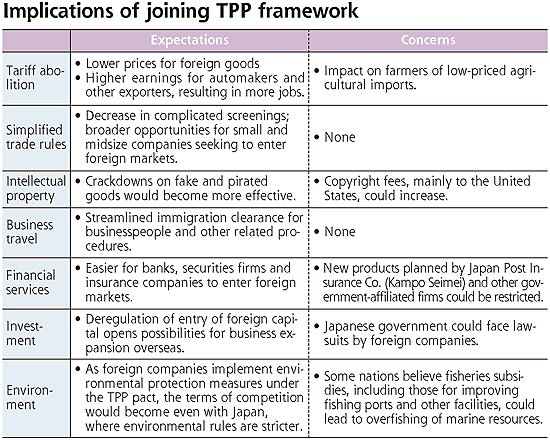Effects of joining TPP mixed / Though imports would become cheaper, some fear threats to food safety

The Yomiuri Shimbun | Mar. 17, 2013
Effects of joining TPP mixed / Though imports would become cheaper, some fear threats to food safety
Joining the Trans-Pacific Partnership (TPP) multilateral free trade agreement would have mixed results for Japan.
For one thing, domestic regulations may have to be changed to conform to international rules.
But how would our livelihoods be changed by membership in the TPP?
Japan imposes tariffs on imports from overseas, mainly on agricultural products.
If the tariffs were gradually lowered through TPP negotiations, consumers could buy imported farm goods at lower prices, lessening the burden on households.
Japan imposes a 38.5 percent tariff on beef, most of which is imported from the United States and Australia. Both are participants in the TPP talks. If the tariff were abolished, gyudon beef bowl restaurant chains using imported beef would likely lower prices by about 20 percent.
Exporters of manufactured goods would also likely benefit from TPP membership. It is expected that exports by Japanese manufacturers, which have a good reputation abroad, would increase, raising companies’ earnings and stabilizing the domestic employment.
Currently, each country sets different rules on trade and investment. The TPP agreement is expected to standardize these rules, reducing red tape. This would make it easier for small and midsize companies with worker shortages to operate overseas.
Currently, Japanese who live in the United States must periodically renew visas to extend their stays, which requires interviews by U.S. consuls general. As it is hard to get appointments, some Japanese applicants have had to wait for up to 20 days. Relaxing criteria for visas would facilitate overseas business trips and the posting of personnel overseas.
The TPP is also expected to set rules for protecting intellectual property rights.
Pirated and fake branded products are rampant, mainly in Asia, and in some cases the fakes are sold for as little as one-quarter of the prices of genuine goods.
Protecting intellectual property rights would be good news for the makers of genuine goods.
Under the TPP, the Japanese government aims to increase exports of such products as popular anime.
Establishing regulations on intellectual property rights would likely help prevent the production and sales of pirated copies in this field, too.
But TPP membership also has a downside.
Some fear that changing Japanese standards on residual agricultural chemicals and labeling of genetically modified foods to conform to more relaxed standards set in the TPP talks could threaten domestic food safety.
In another field, the United States has proposed strengthening patent rights on medicines.
Even so, some Japanese companies, such as pharmaceutical makers, are concerned their generic medicines, which are made with the same effective ingredients after the patents on medicines expire, would not be able to compete with cheaper imports.
One area not likely to be significantly affected by TPP membership is Japan’s public insurance system. Under the system, all citizens are in principle covered by health insurance schemes.





